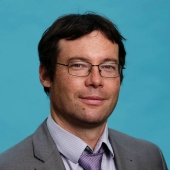About the speaker:
Dr. Simon Freeman serves as a Program Director at the Advanced Research Projects Agency-Energy (ARPA‑E). His focus at ARPA-E is on maritime energy and environmental sensing technologies.
Freeman previously worked as a civilian oceanographer for the U.S. Naval Research Laboratory and the Naval Undersea Warfare Center Division Newport. Freeman was Principal Investigator in the development of inflatable and bioinspired soft robotic systems for underwater vehicle and sensor design, new signal processing methods for acoustic sensing, detection and environmental exploitation, and pressure-tolerant technologies to enhance our access to the seabed.
Freeman earned a B.E. with Honors in Mechanical Engineering and a B.S. in Marine Science from the University of Auckland, New Zealand, and a Ph.D. in Oceanography from Scripps Institution of Oceanography.
Company info:
The Advanced Research Projects Agency-Energy (ARPA-E) advances high-potential, high-impact energy technologies that are too early for private-sector investment. ARPA-E awardees are unique because they are developing entirely new ways to generate, store, and use energy. ARPA-E projects have the potential to radically improve U.S. economic prosperity, national security, and environmental well-being. We focus on transformational energy projects that can be meaningfully advanced over a defined period of time. ARPA-E empowers America's energy researchers with funding, technical assistance, and market readiness. Our rigorous program design, competitive project selection process, and active program management ensure thoughtful expenditures. ARPA-E Program Directors serve for limited terms to ensure a constant infusion of fresh thinking and new perspectives.
Presentation:
Since 2016, the U.S. Department of Energy’s Advanced Projects Research Agency for Energy (ARPA-E) has been funding an effort to start and develop a seaweed cultivation industry in the United States, known as MAcroalgae Research Inspiring Novel Energy Resources, or MARINER. Through the course of the program, new technologies for anchoring, floatation, cultivation, structural integrity, and nutrient access in deep water have been developed, as have novel approaches to breeding and strain selection. This talk will review progress to date and potential future directions of the program. I will also provide an overview of other macroalgae-related projects within the ARPA-E portfolio, including the SEA-CO2 effort to develop carbon flux measurement technology for marine CO2 removal and the Algal Mining exploratory program that seeks to understand the mechanisms and potential of harvesting rare-earths from hyperaccumulating macroalgae.


